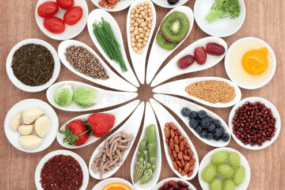
Introduction
In an age where processed foods dominate grocery store shelves, superfoods have emerged as a beacon of hope for those seeking better health. Packed with vitamins, minerals, antioxidants, and other beneficial compounds, superfoods offer more than just basic nutrition. They have been linked to numerous health benefits, from reducing the risk of chronic diseases to enhancing cognitive function and promoting longevity. But what does science say about these nutrient powerhouses? Let’s dive deep into the world of superfoods and understand how they work to boost our health.
What Are Superfoods?
Superfoods are natural, nutrient-rich foods that provide substantial health benefits beyond basic nutrition. While there is no formal definition, these foods are typically high in antioxidants, healthy fats, fiber, and essential vitamins and minerals. They support overall health by improving immune function, reducing inflammation, and enhancing metabolic processes.
Common Characteristics of Superfoods
- High in Antioxidants: Protect the body from oxidative stress and free radical damage.
- Rich in Fiber: Promotes digestive health and helps maintain blood sugar levels.
- Packed with Essential Nutrients: Provide vitamins and minerals necessary for body functions.
- Support Heart Health: Often contain omega-3 fatty acids and other heart-healthy compounds.
The Science Behind Superfoods
Scientific research has increasingly validated the health benefits of superfoods. Below, we explore some of the most well-researched superfoods and their impact on human health.
1. Blueberries: Antioxidant Powerhouses
Blueberries are rich in anthocyanins, flavonoids that provide their deep blue color and potent antioxidant properties. Studies suggest that consuming blueberries regularly can improve brain function, reduce the risk of heart disease, and lower inflammation levels.
Scientific Evidence:
- A study published in The Journals of Gerontology found that blueberry supplementation improved cognitive function in older adults.
- Research in the American Journal of Clinical Nutrition linked blueberry consumption to lower blood pressure and improved vascular function.
2. Chia Seeds: A Nutritional Powerhouse
Chia seeds are an excellent source of omega-3 fatty acids, fiber, and protein. These tiny seeds absorb water, forming a gel-like consistency that aids digestion and promotes satiety.
Scientific Evidence:
- Studies in Nutrition Research show that chia seeds can lower LDL cholesterol and improve heart health.
- Research suggests that their high fiber content supports gut microbiota, improving digestive health.
3. Turmeric: A Natural Anti-Inflammatory
Turmeric contains curcumin, a bioactive compound known for its anti-inflammatory and antioxidant effects. It has been widely studied for its potential role in preventing and managing chronic diseases like arthritis, cancer, and Alzheimer’s disease.
Scientific Evidence:
- A study in The Journal of Alternative and Complementary Medicine found curcumin to be as effective as some anti-inflammatory drugs in reducing joint pain.
- Research in Oxidative Medicine and Cellular Longevity highlights curcumin’s role in reducing oxidative stress and inflammation in chronic diseases.
4. Kale: The King of Greens
Kale is loaded with vitamins A, C, and K, along with fiber, calcium, and powerful antioxidants like lutein and zeaxanthin, which support eye health.
Scientific Evidence:
- Studies in The British Journal of Nutrition show that consuming kale can lower cholesterol levels.
- The high levels of vitamin K in kale support bone health and blood clotting.
5. Dark Chocolate: A Heart-Healthy Treat
Dark chocolate with a high cocoa content (70% or more) contains flavonoids that improve heart health by lowering blood pressure and enhancing blood flow.
Scientific Evidence:
- A meta-analysis in The BMJ found that dark chocolate consumption is associated with a lower risk of cardiovascular disease.
- Studies also indicate that dark chocolate improves brain function by enhancing blood flow to the brain.
How to Incorporate Superfoods into Your Diet
Simple and Delicious Ways to Enjoy Superfoods
- Smoothies: Blend blueberries, chia seeds, and kale into a nutrient-packed smoothie.
- Salads: Add kale, nuts, and seeds for a crunchy, nutritious meal.
- Golden Milk: Enjoy turmeric in a warm beverage with almond milk and honey.
- Dark Chocolate Snacks: Choose dark chocolate with nuts or berries for a healthy treat.
- Chia Pudding: Soak chia seeds in almond milk overnight for a fiber-rich breakfast.
Conclusion
Superfoods are not a magic bullet, but they play a crucial role in a balanced diet and healthy lifestyle. Scientific research continues to support their benefits in reducing disease risk, improving brain function, and promoting longevity. By incorporating superfoods into your daily meals, you can enhance your health one bite at a time. Prioritize whole, nutrient-dense foods and enjoy the numerous benefits they offer for overall well-being.























